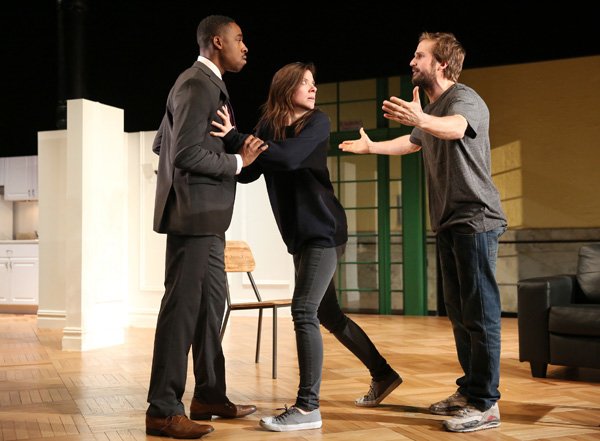Buzzer (Tracey Scott Wilson)
I’m probably not going to give this play as much thought as I should. Just up front.
Buzzer is not about gentrification, it looks like is, it halfway suggests it is, but it’s not. It’s about how you see yourself and how you protect yourself. It’s about telling lies: to yourself and to others, and it’s about allowing those lies to become reality. It’s also not about race, though race is inextricably tied up in its workings.
Jackson is a young black lawyer who has bought an apartment in his old neighborhood. He thinks it is on the verge of gentrification and he wants to be a part of it, but he also wants to see some of his old self in it. He, on some level, misses being part of it, and perhaps of feeling above it all.
His white girlfriend Suzy is a schoolteacher who is unsure of moving to this place, but is willing to give it a shot. Throughout the play she endures harassment by the inhabitants on the block and grows concerned for her own safety and comfort.
The matchstick on the periphery is Don, a white upper class addict that Jackson met in boarding school who briefly lived with Jackson after his dad kicked him out. Over the last decade Don has burned through favors and chances, but convinces Jackson to let him stay, but if he ever uses again he’ll be kicked out.
Danger comes from the inside as Jackson’s late nights mean that Don is the only witness to an ever-frustrated Suzy’s harassment. Over the tense one-act play they grow closer until they reignite a brief affair the two had, leading Don to feel guilty. At the end of it all Don’s covering accidentally provokes Jackson into a fight with the men on the street, Don gets kicked out, and Suzy’s trust in the neighborhood is irrevocably destroyed.
It’s a tight, tense, thoughtful show. One that underlines the power of my preferred style of personal-stakes storytelling.
So much of the experience of the play comes down to who do you believe: Jackson and Don have different perceptions of their time spent in the neighborhood, and Jackson’s reflexive insistence that Don couldn’t possibly know what anything was like, or treating it as a kind of dangerous vacation, leads him to be (to me) the less trustworthy narrator.
I may have missed something about the show, so much of it being under the surface, but whether that would deepen my esteem for it or lessen it, is not something I’m prepared to answer.
As a Producer
This isn’t a Pronoia show- too grim. In terms of Houston theater it feels like a 4th Wall show, and I wouldn’t be surprised if they do it in the next few years.

